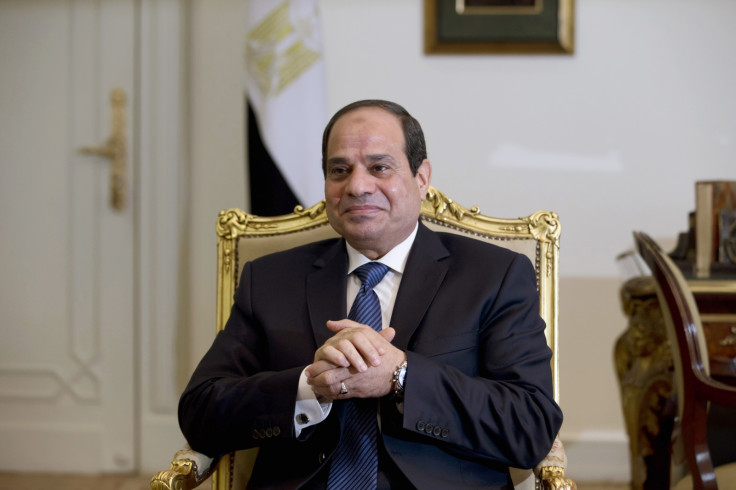Oil price slump will not stop Gulf money pouring into Egypt

The Egyptian government's crackdown on the Muslim Brotherhood isn't quite priceless to the monarchies of Gulf Arab states, but it is clearly worth billions of dollars in financial aid and investment.
With falling oil prices and the emergence of embarrassing audio leaks, that appeared to show top Egyptian officials mocking wealthy donors from the Gulf, there has been a growing debate over whether the Gulf Arabs will cut financial assistance to Cairo.
Oil prices have fallen dramatically since Abdel Fattah al-Sisi was sworn in as Egyptian president in June 2014.
The decline has prompted some analysts to predict a wave of belt-tightening across the Gulf, with Cairo losing out on financial aid that has totalled at least $10bn over the past year, probably much more.
But given the amount that the Gulf states have already committed to Egypt and their apparent desire for influence in what was once the spiritual and intellectual capital of the Arab world, it is unlikely that the royal families would drop the support now over lost oil revenue.
Ruthless drive for stability in Cairo
The vast flow of financial aid from the Gulf to Egypt followed the ouster of the Muslim Brotherhood-aligned president Mohamed Morsi, who happened to be the country's first president elected by a popular vote.
After the money was received, the Egyptian army and other various security forces cracked down hard on the newly criminalised Muslim Brotherhood in the country. It is a campaign of repression that continues to this day and will likely continue.
This policy has involved criminalising and persecuting a significant part of Egyptian society and it could inflict long term damage on the country and its people.
But while the Sisi administration has not impressed Human Rights Watch, it has had succeeded in courting another big US-based NGO.
The International Monetary Fund said this month that the government had succeeded in spurring growth and starting a "turnaround."
The endorsement comes after Cairo pushed through a number of economic reforms, with a focus on reducing government subsidies on staples like bread and fuel.
It has provided a timely boost to the government ahead of next month's investment conference, where Cairo hopes to attract a wave of new foreign investment.
As well as the investor conference, the government's confidence is evident in the series of large-scale infrastructure projects that were announced over the past year.
Egypt has been desperate to showcase its stability and willingness to implement economic reforms to the rest of the world in a bid to attract investment, which has all but dried up over the past four years.
The government still faces a slow-burning insurgency in the Sinai peninsula and Egyptians continue to protest on a small-scale in major cities. But the demonstrations have lost the sheer numbers and revolutionary zeal of the movements that overthrew first Mubarak and later Mohamed Morsi.
Aid will continue
Recent reports have suggested that the Gulf countries, namely Saudi Arabia, the United Arab Emirates and Kuwait, would cut off financial aid to Cairo in the wake of falling oil prices.
However, an Egyptian online newspaper this month leaked a report that suggested the opposite. Al-Youm al-Sabea said the three countries would deposit $10bn in the Egyptian central bank ahead of the investment conference next month.
The oil producers have yet to squeeze public spending or foreign spending in the face of lower prices and they all have extensive cash reserves. Moreover, their financial assistance to Cairo is politically motivated. The monarchies have long viewed the Muslim Brotherhood as the biggest threat to their survival and Sisi's rise to power was too good an opportunity to miss for Gulf monarchs.
"At the end of the day, a lot of this aid was grounded in political issues as opposed to purely economics. It's clear that the Gulf states want to support president al-Sisi and his crackdown on the Muslim Brotherhood and other Islamist organisations," Jason Tuvey, Middle East economist at Capital Economics told IBTimesUK.
"To be honest, $10bn to the UAE, Kuwait and Suadi is a small drop in the ocean, even in the light of falling oil prices," Tuvey said.
Another theory that has gained some currency among analysts was that the death of King Abdullah would alter Saudi Arabia's policies towards the Sisi administration.
Yet, Salman has shown little interest in social or political reforms and is thought to be most interested in maintaining security in Saudi Arabia itself. Following the logic of his predecessor, that would mean stamping out dissent from the Muslim Brotherhood, whose base remains in Cairo.
"The key thing is, King Salman is actually more conservative than King Abdullah in terms of his religious beliefs," Tuvey added.
"Salman made it quite clear when he ascended to the throne that domestic and foreign policy would remain relatively unchanged. I expect there will be continuity."
Of course, with the upcoming investment conference, Egypt is focused on drawing as much foreign capital into the country as it can.
There are reportedly going to be seven major infrastructure projects that Cairo hopes will draw billions of dollars in finance.
However, if Cairo fails to draw the vast amounts of dollars that it is seeking, it can always rely on its friends in the Gulf.
© Copyright IBTimes 2025. All rights reserved.






















